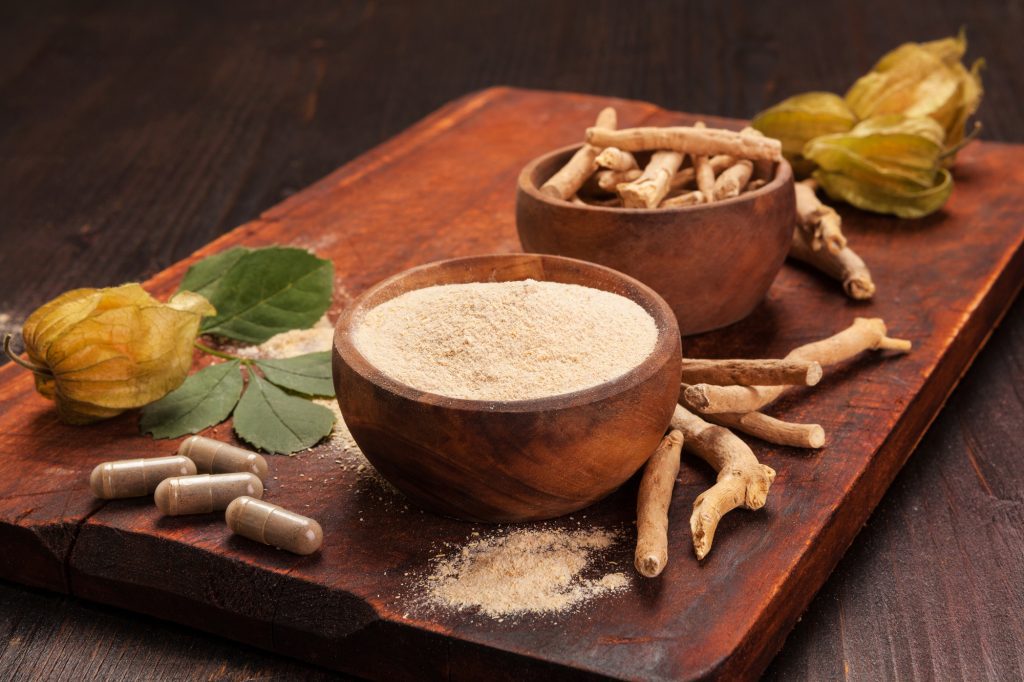Before you consider supplementing with ashwagandha, there are a few things you need to know. Ashwagandha is traditionally used to boost the immune system and combat stress. Bursting with phytochemicals known as withanolides, it’s recognized for its ability to help harmonize your body’s stress response.
You can mix it into your meals or take it as a supplement, but keep in mind, it’s not without potential side effects. It may cause feelings of drowsiness or digestive discomfort. If you’re dealing with an autoimmune or thyroid disorder, tread carefully as it could interact with your medications.
Dr. Gala’s Quick Take
Yes, ashwagandha can help reduce stress and improve sleep. However, it may interact with other supplements or medications. So, be mindful of potential side effects before you start taking it.
How Ashwagandha Works In The Human Body

This potent herb is chock-full of bioactive compounds, primarily withanolides, that work to produce anti-inflammatory and antioxidant effects. These compounds don’t just mend; they strengthen your body. They bolster your immune system and fight stress naturally.
Ashwagandha adjusts your body’s stress response. It has the potential to lower cortisol levels, the hormone often responsible for that nagging feeling of unease. Imagine feeling a wave of calm and relaxation enveloping you; that’s the power of ashwagandha. It’s like having a personal protector against stress, enhancing your resilience and contributing to your overall well-being.
It doesn’t end there. Ashwagandha may also interact with your hypothalamic-pituitary-adrenal (HPA) axis. This is what regulates your body’s response to stress. And if that wasn’t impressive enough, research suggests that it can influence neurotransmitters like GABA and serotonin, amplifying its anxiety-reducing effects. Its ability to potentially modify these neurotransmitters can lead to a more balanced mood and a stronger, more ‘Zen’ you.
Best Food And Natural Sources Of Ashwagandha

You’re probably curious about where you can naturally find this potent herb.
Let’s compare supplements and foods to reveal everything you need to know to make knowledgeable decisions.
Understanding Ashwagandha’s Nutritional Profile
Ashwagandha is typically consumed as a supplement. You will also discover this powerful plant in its original form in certain foods, particularly the roots and leaves. This is a more comprehensive way to tap into its potential health benefits.
The roots are abundant in bioactive compounds like withanolides, bolstering Ashwagandha’s impressive health benefits. Ayurvedic preparations commonly use these adaptogenic properties for overall wellness.
On the other hand, the leaves, dried and powdered, can be incorporated in cooking or teas, introducing a mild, earthy flavor to your meals.
Ashwagandha in Daily Diet

Including Ashwagandha in its natural state with roots and leaves provides numerous health benefits. You’ll seamlessly integrate this powerful herb into your daily diet through various tasty and health-enhancing foods.
Traditional medicine and Ayurvedic recipes frequently recommend ashwagandha-infused ghee, milk, or honey. You can also blend the herb into smoothies, energy balls, or baked goods.
By incorporating ashwagandha into your meals, you’re not just improving the nutritional value of your food, but also actively managing stress and strengthening your immunity. This potent supplement can contribute to an overall sense of well-being.
Cooking With Ashwagandha
Ready to enhance your meals with a sprinkle of health and wellness? Cooking with Ashwagandha, an ancient herb cherished in traditional Indian cuisine, can infuse your dishes with a mild, earthy flavor and an abundance of potential health benefits.
You can effortlessly incorporate the powdered form into Ayurvedic recipes or herbal tonics, elevating not just the flavor but also your well-being. Mixing it into smoothies, teas, and even baked treats creates a quick wellness boost.
With its adaptable nature, you can play around with Ashwagandha in your kitchen, creating everything from hearty stews to zesty rice dishes. Culinary creativity allows you to use the power of Ashwagandha to fuel your journey towards a healthier, more vibrant you.
Ashwagandha: Supplements Vs Food

Ever wondered about the difference between ashwagandha supplements and consuming it directly from natural food sources? Which is best for you? It depends!
Research and evidence show that supplements offer convenience, but Ayurvedic preparations advocate for consuming ashwagandha from food sources like its roots and leaves. These food sources are a storehouse of bioactive compounds and nutrients that supplements might miss.
Studies suggest that food-based ashwagandha enhances absorption making it a more beneficial option. Power doesn’t always come in a pill. Sometimes, it’s brewed in a teapot or cooked in a skillet.
Both supplements and natural sources have clinical backing for their effects on the body. You need to experiment with the flavor to determine whether you can tolerate cooking with it.
Natural Sources of Ashwagandha

It’s important to find ashwagandha in its most natural form. Fresh roots, dried leaves, and berries are packed with ashwagandha’s medicinal properties. The practicality of this intake method may not cooperate with your busy schedule.
That’s where ashwagandha supplements come in, offering similar benefits in easy-to-use forms like powder, capsules, and teas. These maintain the herb’s strength via standardized dosages. So, whether you’re brewing a cup of tea or using capsules, you’re tapping into an ancient wellness tradition easily in your daily routine.
When To Supplement With Ashwagandha
If you’re feeling unusually stressed, wrestling with anxiety, or finding it hard to sleep, you might find it helpful to use ashwagandha. This ancient herb, known for its adaptogenic properties, plays a significant role in managing stress, boosting immunity, and enhancing cognitive function. If you are experiencing fatigue, reduced libido, and poor sleep quality, ashwagandha could help.
Imagine the power you’d have if you could remain on top of your game, immune to seasonal bugs, mentally sharp, and radiating vitality. If you feel anxious, tormented by insomnia, or are constantly worn out, you have weakened immunity, making you susceptible to infections. This herb could provide relief.
How Oriental Medicine Uses Ashwagandha To Address The Root Cause Of An Energetic Disruption In The Body

Drawing from the insights of Oriental medicine, you’ll discover ashwagandha acting as a powerful adaptogen, working to restore balance and correct energetic disruptions within your body. This isn’t just about easing symptoms. This is about addressing the root cause of imbalances in your body’s energy systems. It’s a valuable tool in your pursuit of comprehensive health.
When you welcome ashwagandha into your regimen, you’re taking a step towards harmonizing your body’s energy flow. It’s a component of a personalized treatment plan, designed to address your unique energetic imbalances.
The aim here isn’t just temporary relief. It’s about creating enduring change by addressing the underlying disruptions that are throwing off your energy balance. By incorporating ashwagandha, you’re not just taking a supplement. You’re taking command.
Benefits Of Supplementing With Ashwagandha

Ashwagandha is a potent herb offering a multitude of advantages that could revolutionize your health and well-being.
Here are four key benefits of supplementing with ashwagandha:
- Stress and Anxiety Reduction: Ashwagandha’s adaptogenic properties help your body manage stress more efficiently, lessening anxiety and promoting tranquility.
- Sleep and Cognitive Function Enhancement: It can upgrade your sleep quality and heighten cognitive function, honing your mental clarity and enabling you to perform at your optimum.
- Immune Function and Hormonal Balance: It fortifies your immune function and fosters a healthy hormonal balance, making you more resilient to diseases and enhancing your vibrancy.
- Women’s Wellness, Fertility, and Testosterone Levels: Ashwagandha has shown benefits for women’s wellness and fertility. It can also boost testosterone levels, enhancing libido and overall health.
With ashwagandha, you’re not just getting a supplement; you’re gaining a powerful ally for your health. You’ll boost your strength and empower your body to function at its best.
Cautions If You’re Considering Supplementing with Ashwagandha

While ashwagandha’s health benefits may seem like a golden ticket to wellness, it’s important to be aware of potential side effects and precautions before you begin supplementation. Taking ashwagandha might lead to feelings of sleepiness, a bit of nausea, loose stools, or even vomiting. These are your body’s ways of letting you know it’s adapting to the new regimen.
More seriously, though rare, there have been instances of liver injury linked to ashwagandha, highlighting the need for caution. If you have autoimmune or thyroid disorders, ashwagandha should be avoided, as it could interfere with your condition or medication.
Speaking of medications, be aware of potential interactions, especially if you’re being treated for diabetes or high blood pressure. And if you’re expecting a new family member or nursing one, it’s best to stay safe during pregnancy and breastfeeding.
While short-term use may be safe, the long-term safety of ashwagandha is yet to be firmly established. This emphasizes the importance of monitoring and using caution. With power comes responsibility, so proceed wisely.
Final Thoughts
It’s important to balance the possible advantages with the disadvantages of ashwagandha, remembering that your health and well-being are of utmost importance. Ashwagandha, like any supplement, should be approached with a well-researched, systematic review of its likely benefits and possible risks.
Before you start your experience with ashwagandha, keep these essential points in mind:
- Be aware of possible side effects, like sleepiness and digestive discomfort. Every individual reacts differently, so monitor how you feel.
- Due to the absence of FDA-regulated dosage guidelines, it’s crucial to follow product label instructions carefully.
- Refrain from using ashwagandha if you’re pregnant, breastfeeding, or have specific health conditions like autoimmune disorders.
Ashwagandha is a potent, natural healing source, utilized for generations in Eastern medicine.
Remember, it’s crucial to listen to your body. Ashwagandha could be the secret to unlocking your body’s full potential, but it’s essential to approach it with understanding and caution.
“If you came into my office, I’d ask you a lot of questions that would help us connect the dots … so that together we can deal with your toxic stress.
Every situation is unique and you need a plan that works for you. Not a one-size-fits-all solution.
If you’re thinking you can’t come into my office, don’t worry. I’ve created a program with all of my initial recommendations to help you unravel the mystery. You can use it at home and at your convenience.
So if you’re thinking that managing chronic stress just isn’t possible … or even the answer … for you, I want to show you what you may be missing.
And how you can identify the toxic stressors that are creating your symptoms with my Human Energy System Reboot. You can get started HERE.” – Dr. Gala













